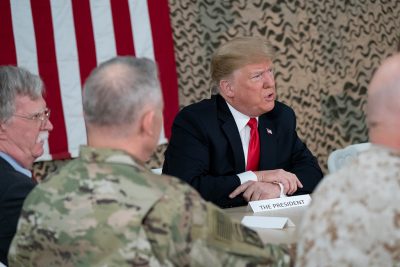White House Asked for Options to Strike Iran After Baghdad Attack: Report
National Security Council request came after mortars fired in September into area that houses US embassy in Baghdad, says Wall Street Journal

The White House’s national security team asked the Pentagon to provide it with options for striking Iran, after a group aligned with Tehran fired mortars in September into an area in Baghdad that is home to the US embassy, a US newspaper reported.
The request by the National Security Council (NSC), which is led by John Bolton, sparked deep concern among Pentagon and State Department officials, the Wall Street Journal (WSJ) reported on Sunday, citing current and former US officials.
“It definitely rattled people,” one former senior US administration official told the WSJ.
“People were shocked. It was mind-boggling how cavalier they were about hitting Iran.”
The Pentagon complied with the request, but it is not known whether the options for an Iran strike were also provided to the White House or if President Donald Trump knew about it.
The decision to consider striking Iran was prompted by an incident in early September, in which three mortars were fired into a diplomatic quarter in Baghdad.
The shells landed in an open lot and no one was hurt.
Two days later, unidentified fighters fired three rockets that hit close to the US consulate in the southern city of Basra but caused no serious damage.
NSC spokesman Garrett Marquis said in a statement on Sunday that “the NSC coordinates policy and provides the president with options to anticipate and respond to a variety of threats” and it will continue to consider “the full range of options” after the attacks in Basra and Baghdad.
Former US officials said it was unnerving that the NSC asked for such far-reaching military options in response to attacks that caused little damage and no injuries.
‘Act of war’
As a think tank scholar and Fox News commentator, Bolton often urged Washington to attack Iran, including in a 2015 New York Times op-ed titled: “To stop Iran’s bomb, bomb Iran.”
Relations between Tehran and Washington are highly fraught following Trump’s decision in May to withdraw from a 2015 nuclear deal between Iran and world powers and to reimpose sanctions, including on Iran’s vital oil sector.
In September, Bolton, who worked hard on the withdrawal from the treaty, warned Tehran that there would be “hell to pay” if Iran threatened the US or its allies.
In the same month, US Secretary of State Mike Pompeo also stated the US was willing to target Iran for the actions of its allies in Iraq.
“Iran will be held accountable for those incidents,” he said in a 21 September interview with CNN.
“Even militarily?” asked CNN’s Elise Labott.
“They’re going to be held accountable,” Pompeo replied. “If they’re responsible for the arming and training of these militias, we’re going to go to the source.”
Alongside the requests in regards to Iran, the NSC asked the Pentagon to provide the White House with options to respond with strikes in Iraq and Syria as well, according to people familiar with the talks, the WSJ said.
In one meeting, Bolton’s then deputy Mira Ricardel, who was forced out of her job in November after a feud with First Lady Melania Trump, described the attacks in Iraq as “an act of war” and said the US had to respond decisively, according to one person familiar with the meeting.
‘Anti-Iran circus’
On Sunday, Iran’s foreign ministry summoned a senior Polish diplomat in protest at Poland jointly hosting a global summit with the US focused on the Middle East, particularly Iran, state news agency IRNA reported.
Pompeo said on Friday that the summit, to be held in Warsaw on 13-14 February, would focus on stability and security in the Middle East, including on the “important element of making sure that Iran is not a destabilising influence”.
Pompeo told Fox News that dozens of countries would attend the summit which would aim to “build out the global coalition” opposed to Iranian policies in the region.
Poland’s charge d’affaires was told that Iran saw the decision to host the meeting as a “hostile act against Iran” and was warned that Tehran could reciprocate, IRNA added.
Iranian Foreign Minister Mohammad Javad Zarif described the summit as a “desperate anti-Iran circus”.
*
Note to readers: please click the share buttons above. Forward this article to your email lists. Crosspost on your blog site, internet forums. etc.
Featured image is from Geopolitics Alert

